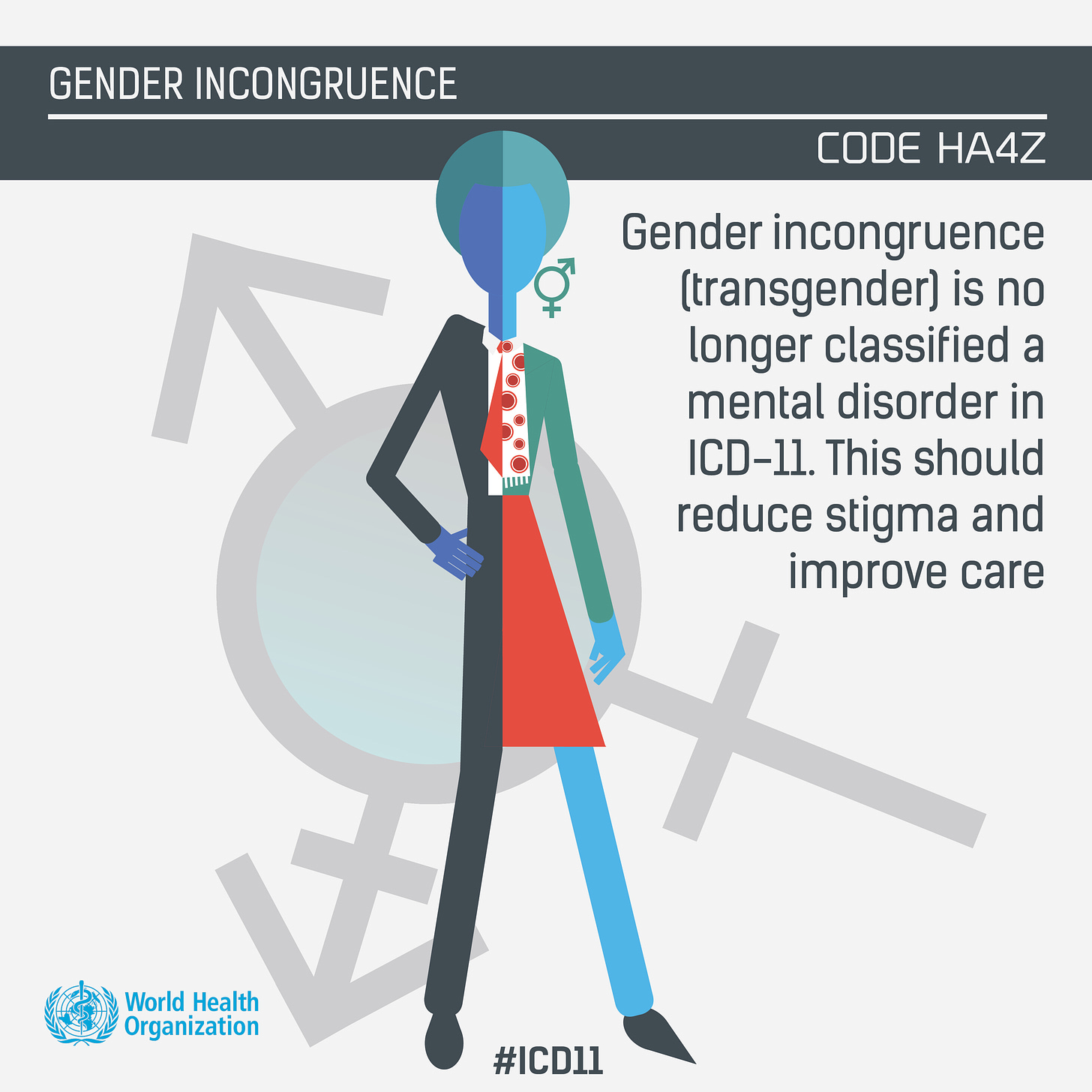When I first noticed the shift from gender dysphoria to gender incongruence seemed to me to be primarily about normalizing an ever-widening range of body modifications. (And don’t get me wrong: that’s still a big part of it!)
But watching the discouraging data about patient mental health outcomes—data that researchers and clinicians refuse to translate into evidence that transition works or doesn't work—roll in, it occurs to me that incongruence triumphed over dysphoria for other reasons.*
Incongruence's infinite flexibility is attractive, of course. But incongruence has other advantages. Incongruence makes no promises that transition will improve mental health, whereas treatments for gender dysphoria really ought to improve patients' quality of life overall.
Unfortunately, that doesn't seem to be happening.
So it’s much more convenient for clinicians to be able to say: We treated the patient's gender incongruence so it doesn't matter if the patient got worse on every other count. Xie didn't want breasts, we removed xir breasts, the treatment was a success!
This shift was well underway at last week's EPATH conference in Killarney, Ireland. Researchers presented findings that were often devastating to the claims that 'gender-affirming care' is effective and life-saving. Then declined to draw any conclusions.
GIDS presented research showing that adolescent patients experienced a rise in self harm and deterioration of social-communication skills six months *after* initiating ‘gender-affirming’ treatment. A Swedish researcher had the misfortune to find that “youth with gender dysphoria diagnoses face persisting mental health challenges after initiation of treatment with puberty blockers and gender-affirming hormones,” including increased psychiatric hospitalization. That wasn’t supposed to happen.
The researcher said she was “really concerned about how results will be interpreted,” since “as you all know, there are improved mental health outcomes following puberty blockers and gender-affirming hormones.”
“Gender-affirming treatment is supposed to alleviate gender dysphoria,” she reiterated. “It would be a good thing if it alleviated other mental health challenges but even if mental health challenges persist, that doesn’t mean it’s not the right treatment for gender dysphoria.”
In response, a prominent Dutch researcher mused: “What should we use as an outcome measure? Mental health needs? What if you ask the kids: are you happy with the treatment and they say, ‘yes, we are happy’?”
This is a sharp diminishment of the grand claims made at previous conferences where it’s even been suggested that treating gender dysphoria could alleviate symptoms of autism.
For years, the pressure groups pushing transition have argued that the data will soon vindicate their bold experiments in human development and endocrine function. But the now data is coming in and it's not living up to expectations.
That means clinicians and researchers must pivot—fast. 'Gender incongruence' lets clinicians off the hook for bad outcomes. It lets researchers dismiss alarming findings. Because “we weren't treating that.”





This is a relief to read. If the outcomes were more positive, I would be concerned. It's not that I don't want transgender people to have good outcomes. But if they did, it would go against the grain of everything I know about humanity.
Years ago there was a show which gave free cosmetic surgery to people with what you might call mild deformities. For example, one woman had a hook nose and buck teeth. When those things were repaired, she felt dramatically better about herself. Now, THAT'S what you could call "affirming" surgery, because it made her more attractive as what she already was, a woman. But when a person is imagining that they were born the wrong sex, and they get surgery to change the appearance of their bodies, that's not anything that could be called an improvement.
So what about people who have true gender dysphoria? Are they made happier by their surgeries? If they are, that could only happen if (1) the surgery was successful, without serious complications, and (2) the person getting the surgeries is convinced that his or her body has actually been changed to the opposite sex. What I think happens in most cases is that they eventually realize that the surgeries are fake. Sooner or later they face the fact that they have fake breasts and fake vaginas and fake penises, not to mention that many of them are sterile. When they start to face those realities, their satisfaction evaporates and the dysphoria returns.
I've mentioned this before in my comments, but it deserves saying again. I once saw an interview with an extraordinarily handsome man who wanted to become a woman. But he was so extremely handsome as a man, I found myself thinking, "Why sacrifice your perfection as a male to become a strange-looking and imperfect female?" On an emotional level, I guess I still don't get it.
I looked up the definition of incongruence on APA website. Each of the three definitions fits trans crap delightfully https://dictionary.apa.org/incongruence. From "one’s subjective evaluation of a situation is at odds with reality" to "lack of alignment between the real self and the ideal self" to "a lack of genuineness, honesty, or open expression on the part of the therapist in his or her interactions with a client"... Boy, this is it for real. So, basically they admit that the logic goes something like : "Hey, this person doesn't see the reality so let's move reality closer to what this person sees."